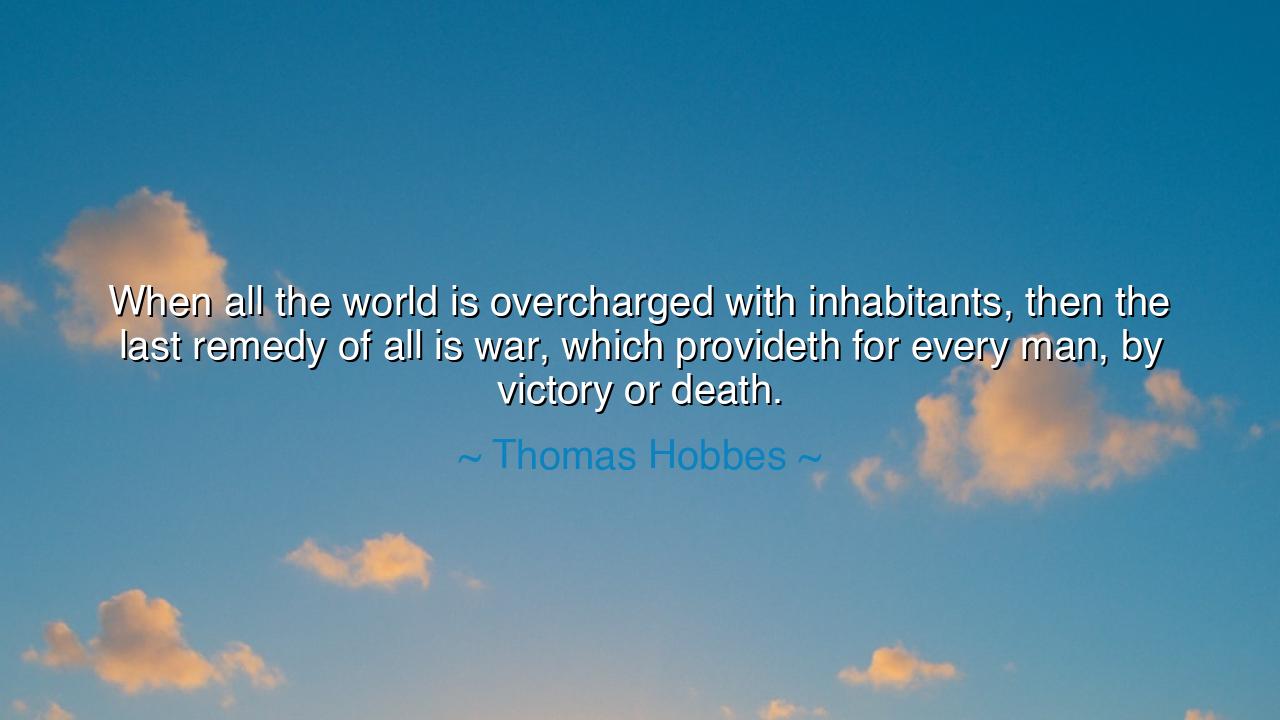
When all the world is overcharged with inhabitants, then the last
When all the world is overcharged with inhabitants, then the last remedy of all is war, which provideth for every man, by victory or death.






“When all the world is overcharged with inhabitants, then the last remedy of all is war, which provideth for every man, by victory or death.” — thus wrote Thomas Hobbes, the philosopher of power and fear, whose gaze pierced the fragile veil of civilization and beheld the primal nature of humankind. These words, taken from the depths of his reflections in Leviathan, speak of a grim and ancient truth — that when the earth grows crowded and resources grow scarce, when human desire outweighs human restraint, war arises not as choice but as consequence. It is the final remedy, the brutal cleansing by which nature rebalances what men have overreached.
In this quote, Hobbes reveals the shadow that follows progress. For as long as humanity multiplies — building cities, filling lands, and expanding its dominion — it also plants the seeds of conflict. To Hobbes, war is not born from the love of bloodshed alone, but from the collision of needs — when too many hands grasp at too little sustenance, when greed eclipses grace. In such a world, he warns, peace cannot hold forever. War, terrible as it is, becomes the instrument through which nature reclaims order, through victory or death. In his view, it is not cruelty, but the cold arithmetic of survival.
The ancients, too, understood this law of the world. When the Greek city-states flourished, and their populations swelled, they sent their sons across the seas to found colonies — for they knew that if their people stayed, hunger would soon turn into strife. And when Rome, glutted with wealth and citizens, reached its limits, its legions turned outward once more, seeking conquest to feed an empire too vast to sustain itself. Each time the earth groaned under the weight of humanity, men marched to war — sometimes for pride, sometimes for gold, but often because they believed there was no other way to live.
Hobbes wrote in the 17th century, amid the turmoil of civil war, when neighbor turned upon neighbor and kingdoms burned in pursuit of sovereignty. From this chaos he forged his philosophy — that man, left without a strong and just order, will descend into the state of nature, where life is “nasty, brutish, and short.” Yet in this particular reflection, he looked beyond his own nation and saw a truth that spans centuries: that the instinct for survival drives both individuals and societies, and when peace can no longer sustain that instinct, war takes its place as the final arbiter.
But though his words sound bleak, there lies within them a warning meant not to glorify destruction, but to prevent it. Hobbes understood that war is the failure of wisdom — the last resort when all foresight and compassion have been exhausted. His message is not that war is destiny, but that it is the price of ignoring the balance of life. If humanity multiplies without measure, consumes without thought, and covets without restraint, then war becomes inevitable. But if man learns moderation, justice, and unity, he may avert the blade before it falls.
Consider the story of World War I, often called “the war to end all wars.” Europe, overfilled with ambition and alliances, had reached a boiling point. Populations grew restless, nations sought empire, and pride overflowed. The result was catastrophe: millions dead, empires broken, and generations scarred. It was as though the earth itself demanded payment for the excesses of men. And yet, from that ruin came a faint glimmer of Hobbesian truth — that peace must be tended by strength, and strength must be guided by restraint.
Thus, my child, let this be the lesson: war is not a destiny written in the stars, but a shadow cast by human folly. When we live without balance — when our desires exceed our wisdom, when our numbers exceed our compassion — the shadow grows darker, and the world edges closer to the brink. The wise man does not wait for war to come; he seeks peace while there is still time. He tempers growth with gratitude, ambition with mercy, power with understanding.
For as Thomas Hobbes teaches, when the world is “overcharged” — when men take more than the world can give — war becomes nature’s correction. But the enlightened soul can break this cycle, for he knows that true victory is not found in conquest or in death, but in the preservation of harmony. Let us then live as stewards, not as conquerors; as builders, not as destroyers. Only then shall the world remain full — not of corpses, but of life.






AAdministratorAdministrator
Welcome, honored guests. Please leave a comment, we will respond soon